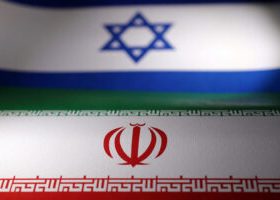JERUSALEM/CAIRO/NEW YORK — United States President Joseph R. Biden said on Monday he hopes to have a ceasefire in the Israel-Hamas conflict in Gaza start by next Monday as the warring parties appeared to close in on a deal during negotiations in Qatar that also aim to broker the release of hostages.
The presence of both sides for so-called proximity talks — meeting mediators separately but in the same city — suggested negotiations were further along than at any time since a big push at the start of February, when Israel rejected a Hamas counter-offer for a four-and-a-half-month truce.
Mr. Biden said he hoped a ceasefire would start within days. “Well, I hope by the beginning of the weekend, by the end of the weekend,” he said, when asked when he expected a ceasefire to start.
“My national security adviser tells me that we’re close. We’re close. We’re not done yet. My hope is by next Monday we’ll have a ceasefire,” Mr. Biden told reporters during a visit to New York.
A US official said US negotiators had been pushing hard to get a pause-for-hostages deal by Ramadan’s beginning on March 10 and top US officials were working on the issue last week. The optimism appeared to grow out of meetings between the Israelis and Qataris, the official said.
In public, Israel and Hamas continued to take positions far apart on a possible truce, while blaming each other for delays.
After meeting Qatari Emir Sheikh Tamim bin Hamad Al Thani, Ismail Haniyeh, the reclusive head of Hamas, said his group had embraced efforts to find an end to the war, and accused Israel of stalling while Gazans die under siege.
“We will not allow the enemy to use negotiations as a cover for this crime,” he said.
Israeli Prime Minister Benjamin Netanyahu said Israel was ready for a deal, and it was up to Hamas to drop demands he described as “from another planet.”
“Obviously, we want this deal if we can have it. It depends on Hamas. It’s really now their decision,” he told US network Fox News. “They have to come down to reality.”
Al Thani’s office said Al Thani and the Hamas chief had discussed Qatar’s efforts to broker an “immediate and permanent ceasefire agreement in the Gaza Strip.”
A source told Reuters earlier that an Israeli working delegation had flown to Qatar to create an operational center to support negotiations. Its mission would include vetting proposed Palestinian militants that Hamas wants freed in a hostage release deal, the source said.
Israel continues to maintain in public that it will not end the war until Hamas is eradicated, while Hamas says it will not free hostages without an agreement to end the war.
“We’re totally committed to wipe Hamas off the face of the Earth,” Israel’s economy and industry minister, Nir Barkat, told Reuters at a conference in the United Arab Emirates, where his presence signaled Israel’s continued acceptance by Arab states that has angered Palestinian militants.
Senior Hamas official Sami Abu Zuhri told Reuters on Monday any ceasefire agreement would require “securing an end to the aggression, the withdrawal of the occupation, the returning of the displaced, the entry of aid, shelter equipment, and rebuilding.”
Israel is under pressure from its main ally the United States to agree on a truce soon, to head off a threatened assault on Rafah, the city in southern Gaza where over half the enclave’s 2.3 million people are sheltering, which Washington fears could become a bloodbath.
‘WE’LL GO IN’
Mr. Netanyahu insisted an assault on Rafah was still planned, and Israel had a plan to evacuate civilians from harm’s way. Asked if Israel would attack even if Washington asked it not to, Mr. Netanyahu said: “Well, we’ll go in. We make our own decisions, obviously, but we’ll go in based on the idea of having also the evacuation of the civilians.”
The momentum behind talks appears to have grown since Friday, when Israeli officials discussed terms of a hostage release deal in Paris with delegations from the United States, Egypt and Qatar, though not Hamas.
Since Hamas killed 1,200 people and captured 253 hostages on Oct. 7, Israel has launched an all-out ground assault on Gaza, with nearly 30,000 people confirmed killed, according to Gaza health authorities.
In a development that could have an impact on longer-term negotiations, the prime minister of the Palestinian Authority, which exerts limited civil control in parts of the West Bank, stepped down on Monday.
Mohammad Shtayyeh said he was resigning to allow for the formation of a broad consensus among Palestinians about political arrangements following the Gaza war.
The PA, recognized by the West as the official representative of Palestinians, lost control of Gaza to Hamas in 2007. Washington has called for reforms to the PA as part of an overall solution to govern Palestinian territories including Gaza after the war. — Reuters








